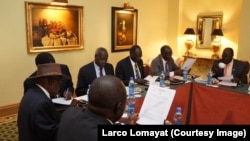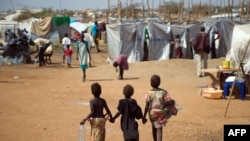JUBA —
The South Sudanese government said Wednesday it is hopeful that the two sides at peace talks in Addis Ababa are close to reaching a ceasefire agreement, even as fighting continues to rake the world's newest nation.
“I want to tell you that it will not be very long until a cessation of hostilities agreement is signed," Ateny Wek Ateny, a spokesman for President Salva Kiir, told reporters in Juba.
He said only two items "are left to be discussed" at the talks, which nearly two weeks ago brought teams of negotiators for Kiir and his political rival, former Vice President Riek Machar -- whom Kiir has accused of starting the unrest in South Sudan by trying to overthrow him -- to the Ethiopian capital.
"Those two items may be exhausted today, and if they are exhausted today, there will be no problem to see the two sides signing the cessation of hostilities," Ateny said.
Even as he spoke, fighting raged in Jonglei, Unity and Upper Nile states, including in the town of Malakal, which rebels said they recaptured on Tuesday.
Medical charity Doctors Without Borders said hundreds of people have been wounded over the past few days in fighting in the three states, where the capital cities have become key battlegrounds in the month-long conflict.
Malakal, Bentiu in Unity state and Bor in Jonglei were captured by rebels early on in the conflict. Government troops recaptured Malakal at the end of December and last week took Bentiu back from rebels, saying their next target would be Bor.
Ateny denied that rebels have retaken control of Malakal in oil-rich Upper Nile state, and army spokesman Philip Aguer said fighting was continuing in the town.
South Sudan plunged into conflict on Dec. 15, when renegade soldiers attacked an army headquarters building in Juba.
Although no precise death toll is available for the conflict, the U.N. Mission in South Sudan (UNMISS) this week said it believes up to 10,000 people may have been killed.
More than 400,000 South Sudanese civilians have been driven from their homes by the fighting, with most believed to be internally displaced in the country and nearly 80,000 fleeing to neighboring countries.
The peace talks for South Sudan resumed Monday after bogging down, largely over the government's refusal to consider one of the demands posed by negotiators for the opposition side, that 11 high-ranking political figures who were detained when fighting first erupted in Juba on Dec. 15 be released.
“I want to tell you that it will not be very long until a cessation of hostilities agreement is signed," Ateny Wek Ateny, a spokesman for President Salva Kiir, told reporters in Juba.
He said only two items "are left to be discussed" at the talks, which nearly two weeks ago brought teams of negotiators for Kiir and his political rival, former Vice President Riek Machar -- whom Kiir has accused of starting the unrest in South Sudan by trying to overthrow him -- to the Ethiopian capital.
"Those two items may be exhausted today, and if they are exhausted today, there will be no problem to see the two sides signing the cessation of hostilities," Ateny said.
Even as he spoke, fighting raged in Jonglei, Unity and Upper Nile states, including in the town of Malakal, which rebels said they recaptured on Tuesday.
Medical charity Doctors Without Borders said hundreds of people have been wounded over the past few days in fighting in the three states, where the capital cities have become key battlegrounds in the month-long conflict.
Malakal, Bentiu in Unity state and Bor in Jonglei were captured by rebels early on in the conflict. Government troops recaptured Malakal at the end of December and last week took Bentiu back from rebels, saying their next target would be Bor.
Ateny denied that rebels have retaken control of Malakal in oil-rich Upper Nile state, and army spokesman Philip Aguer said fighting was continuing in the town.
South Sudan plunged into conflict on Dec. 15, when renegade soldiers attacked an army headquarters building in Juba.
Although no precise death toll is available for the conflict, the U.N. Mission in South Sudan (UNMISS) this week said it believes up to 10,000 people may have been killed.
More than 400,000 South Sudanese civilians have been driven from their homes by the fighting, with most believed to be internally displaced in the country and nearly 80,000 fleeing to neighboring countries.
The peace talks for South Sudan resumed Monday after bogging down, largely over the government's refusal to consider one of the demands posed by negotiators for the opposition side, that 11 high-ranking political figures who were detained when fighting first erupted in Juba on Dec. 15 be released.





